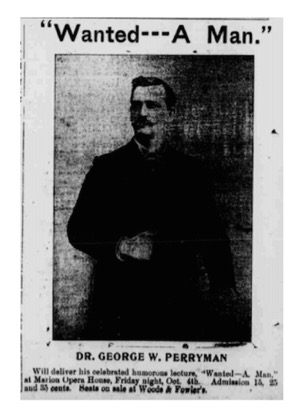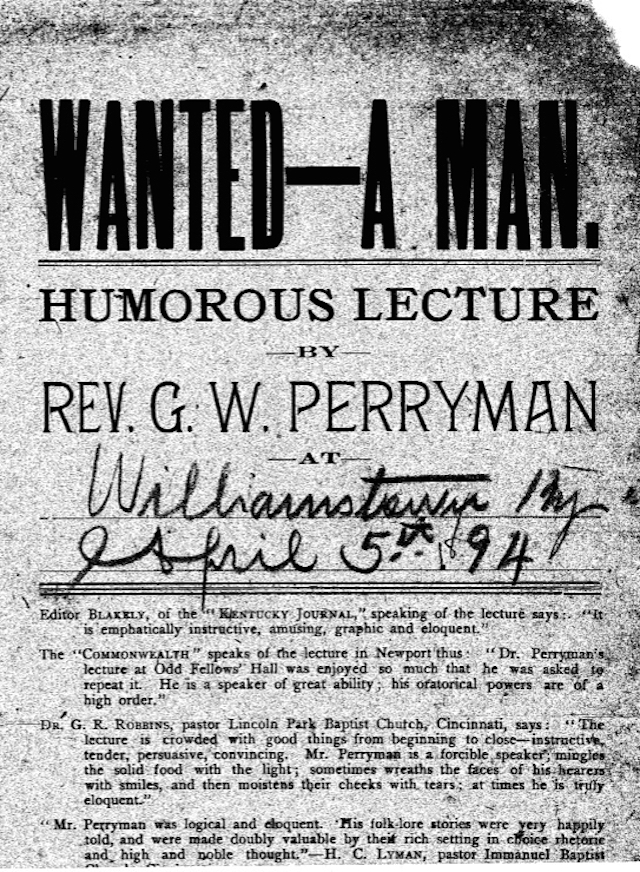| ||||||||||
Dr. Ronald P. Rogers CHIROPRACTOR Support for your body's natural healing capabilities 270-384-5554 Click here for details 


Columbia Gas Dept. GAS LEAK or GAS SMELL Contact Numbers 24 hrs/ 365 days 270-384-2006 or 9-1-1 Call before you dig Visit ColumbiaMagazine's Directory of Churches Addresses, times, phone numbers and more for churches in Adair County Find Great Stuff in ColumbiaMagazine's Classified Ads Antiques, Help Wanted, Autos, Real Estate, Legal Notices, More... 
|
'That magnificent voice' - G.W. Perryman, Russell Co, KY - III In this installment, JIM covers Rev. G.W. Perryman's activity on the lecture circuit, offering lectures 'full of fun and good common sense.' A favorite was 'Wanted - A Man.' A Blank Advertisement. A nugget: Rev. G.W. Perryman played a big role in securing a Carnegie grant for a public library in Paducah, McCracken County, KY, where according to this story opened with 'around 1,800 volumes.' An ardent prohibitionist, Dr. Perryman, once thundered from the pulpit, JIM says, 'I want you one and all to understand that if any of you are for the saloon, high or low license, that I will make is so warm for you that you will not have to sit close to the registers in this church.'" for the lecture appears as a linked photo with this piece. Next earlier installment: 'That magnificent voice' - G.W. Perryman, Russell County, KY - Part II Contributed by JIM "That magnificent voice:" The life and times of Rev. G.W. Perryman, late of Russell County, Kentucky. Part III When last we left Rev. G.W. Perryman and family, they were preparing to move from Middlesboro to Paducah, where he had accepted a pastorate. This transition is a good time to briefly step away from the chronology of his life and look at aspects beyond the pulpit. In addition to the responsibilities attendant to being a full-time pastor, Rev. Perryman was also active on the lecture circuit, beginning in 1893. His topics included "Grit, Go, and Git," "The Preacher for the Times," and "The Mountaineer as I Saw Him," delivered in Humboldt, Tenn., in 1903 at a meeting of Baptist church workers. "Wanted--A Man" seemed to be an audience favorite; the "Paducah Sun" said of it, "the lecture was full of fun and good common sense, and a credit to this talented minister." He presented "A Live Wire" at the courthouse in Columbia, Ky., in late September 1900. In the summer of 1909, at the behest of Russell County native and his boyhood friend U.S. Haynes, Rev. Perryman traveled twelve hundred miles and more from Norfolk, Virginia, to Maryville, Nodaway County, Missouri, to speak at the Chautauqua there, his chosen topic being "The Man Behind the Gun." A few days later, Mr. Haynes wrote a letter to the "Adair County News" telling of the experience. In the space of a few sentences, he spoke eloquently of Rev. Perryman's charisma, his force of character, and his powerful speaking abilities: "Last Saturday and Sunday, August 21 and 22nd, Dr. Go. W. Perryman, formerly of old Russell county, Ky., but now of Norfolk, Va., appeared on the platform of the old mother Chautauqua of Missouri. He came here practically a stranger, possibly not more than a dozen knew him. "He was driven from the train to the platform, a few hundred yards away. He took his seat on the platform but not a single hand clasp greeted him. "His first remarks were the usual congratulations, the beautiful grounds management, etc. Then his subject, 'The Man Behind the Gun.' He poured out his most wonderful talent with that magnificent voice of his on hundreds of listeners. Evidently, such impressions were never before made on many of his hearers as he made..." "The writer had a good position and I declare I did not see a single person leave the tent during the service..." And too, Dr. Perryman became increasing involved in the Prohibition movement. It isn't known exactly when he began advocating for the temperance, but the movement itself began gathering steam when the Anti-Saloon League, formed in northern Ohio as a state organization in 1893, went national two years later. Certainly, as pastor of the Deaderick Avenue Baptist Church in Knoxville during part of the 1900-1909 era, his voice rang loud and clear in the run-up to the wet-dry election held in November 1907. In "Liquor in the Land of the Lost Cause: Southern White Evangelicals and the Prohibition Movement" (2007, p 59), author Joe Coker quoted Rev. Perryman as having thundered to his congregants one Sunday from the pulpit, "I want you one and all to understand that if any of you are for the saloon, high or low license, that I will make is so warm for you that you will not have to sit close to the registers in this church." With his voice and blistering rhetoric lending powerful credence to the prohibition forces from the pulpit, from the temperance circuit, and from his position as President of the Knoxville Civic Club (or Federation), the city voted itself dry a dozen years before Prohibition went into effect nationwide. While pastoring in Virginia a few years later, he led the charge there for a successful state-wide prohibition vote in the fall of 1914, although the law didn't go into effect until nearly a year after his passing. After accepting the call to pastor a church in Kentucky in late 1914, he spent some three months in the spring and summer of the following year canvassing on behalf of Prohibition candidates in the run up to the August primary, including several days in Taylor, Adair, and Russell counties. A few days after that primary, in which gubernatorial candidate A.O. Stanley cleaned the clock of Prohibitionist H.V. McChesney, "The Baptist World" published a letter in which Dr. Perryman expressed his views of the election's outcome. In it he blasted any and all "wet" Baptists: "I know Baptists who claim to be so orthodox that they wouldn't think about uniting with other churches to win souls, but went last Saturday and united with whisky powers, whose record is bloody, whose business is to destroy every home they possibly can...Bad indeed to strike at the saloon and hit a Baptist square between the eyes." National prohibition didn't go effect until early 1920, four year after Rev. Perryman's death. One must wonder how, years later, he might have reacted both to the repeal of Prohibition and to the unintended consequences it (Prohibition) had wrought, including the meteoric rise of the American crime families known in the vernacular as the Mob; the proliferation of moonshiners, bathtub gin, speakeasies, and bootleggers; and another perceived social evil, jazz music. In December 1933, just short of fourteen years after it went into effect, the 21st Amendment negated the Volstead Act. In 1932, John D. Rockefeller, Jr., who had been a strong advocate for the dry forces, wrote in a letter, "When Prohibition was introduced, I hoped that it would be widely supported by public opinion and the day would soon come when the evil effects of alcohol would be recognized. I have slowly and reluctantly come to believe that this has not been the result. Instead, drinking has generally increased; the speakeasy has replaced the saloon; a vast army of lawbreakers has appeared; many of our best citizens have openly ignored Prohibition; respect for the law has been greatly lessened; and crime has increased to a level never seen before." During his tenure in Paducah, G.W. was a driving force in obtaining from philanthropist Andrew Carnegie the sum of $35,000 with which to build the Carnegie Library (now called the McCracken County Public Library) and to initially stock it with around 1,800 volumes. Also in Paducah, Rev. Perryman was associated with the Citizens' Good Government league, likely a thinly veiled public morals group; one his sermon there was "Blood Flows in the Wake of Violated Laws," with the text "taken from local conditions." In early December 1903, at a meeting of the local Ministerial Association held in Rev. Perryman's study at the church, two other local pastors were assigned as a committee to "take steps toward having pictures, deemed objectionable, advertising theatrical performances, removed from bill boards around the city." And too, it was in that city that from the pulpit he took on a modern societal scourge, the shirtwaist. In the summer of 1901, the Stanford, Ky. "Semi-Weekly Interior Journal" newspaper reported that "Rev. G.W. Perryman, of the Paducah First Baptist church, is the first preacher to come out in favor of the shirt waist. He will not wear one himself, but invites all the men of his congregation to wear them." The offending clothing was, in short, a utilitarian ladies' garment. A PBS article titled "What is a Shirtwaist?" succinctly lays out what likely drew Rev. Perryman's ire -- not so much the garment as that for which it stood (emphasis added): "A popular fashion item of the late19th and early 20th centuries, the shirtwaist blouse was regarded as the model shirt for the independent, working woman...The shirtwaist, however, came to represent more than a momentary fashion trend; the blouse was a symbol of newfound female independence in a time of progressive ideas..." To be continued. (The foregoing is adapted from "That Magnificent Voice: A Word Sketch of Rev. George W. Perryman, a Man of His Convictions," (c) 2017. Material adapted and used with permission.) This story was posted on 2017-03-26 09:58:05
Printable: this page is now automatically formatted for printing.
Have comments or corrections for this story? Use our contact form and let us know.
More articles from topic Jim: History:
JIM: Travel advisory for Faubush area 'That magnificent voice' - G.W. Perryman, Russell County, KY - Part II JIM: Elder Williams & the aeroplane: 'It sure was a grand sight.' On Montpelier: Heaven is a Kentucky of a place 'That magnificent voice' - G.W. Perryman, Russell Co., KY JIM - Mrs. Berg Visits Columbia: The Rest of the Story Jim/Lindsey Wilson History: The Cottage on Arbor Vitae Hill JIM resurrects blistery hot editorial from 1904 JIM: The big snow of January 1917 Mr. McLean & Rev. Kasey ring in 1907 with sunshine & shadows View even more articles in topic Jim: History |



|
||||||||
|
| ||||||||||
|
Quick Links to Popular Features
Looking for a story or picture? Try our Photo Archive or our Stories Archive for all the information that's appeared on ColumbiaMagazine.com. | ||||||||||
|
Contact us: Columbia Magazine and columbiamagazine.com are published by Linda Waggener and Pen Waggener, PO Box 906, Columbia, KY 42728. Please use our contact page, or send questions about technical issues with this site to webmaster@columbiamagazine.com. All logos and trademarks used on this site are property of their respective owners. All comments remain the property and responsibility of their posters, all articles and photos remain the property of their creators, and all the rest is copyright 1995-Present by Columbia Magazine. Privacy policy: use of this site requires no sharing of information. Voluntarily shared information may be published and made available to the public on this site and/or stored electronically. Anonymous submissions will be subject to additional verification. Cookies are not required to use our site. However, if you have cookies enabled in your web browser, some of our advertisers may use cookies for interest-based advertising across multiple domains. For more information about third-party advertising, visit the NAI web privacy site.
| ||||||||||


















































